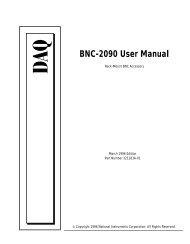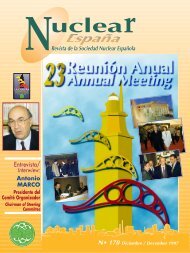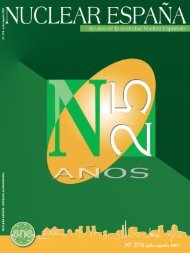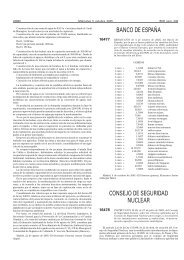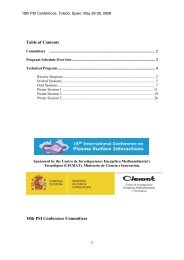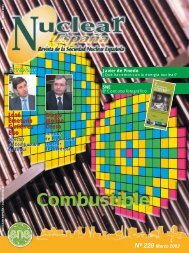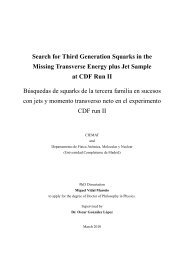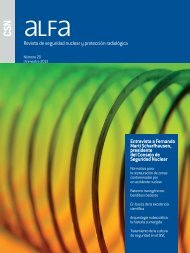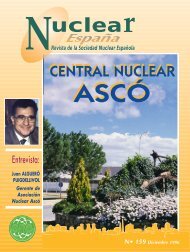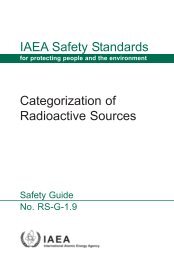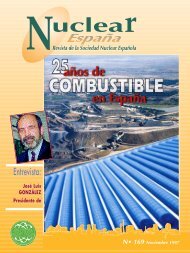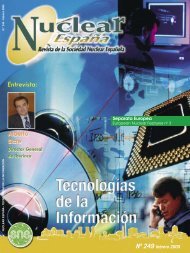EntrEntr evista/evista/ InterInter viewview
EntrEntr evista/evista/ InterInter viewview
EntrEntr evista/evista/ InterInter viewview
You also want an ePaper? Increase the reach of your titles
YUMPU automatically turns print PDFs into web optimized ePapers that Google loves.
DESARROLLO TECNOLÓGICO<br />
economía internacionalizada cobra<br />
total significado el proceso antes<br />
descrito.<br />
El proceso de desregulación y<br />
apertura de los mercados experimentado<br />
en España es común a<br />
otros países. Por este motivo y por<br />
otros de diversa índole, siempre relacionados<br />
con la globalización,<br />
las amenazas y las oportunidades<br />
para el desarrollo tecnológico no<br />
se circunscriben al ámbito nacional.<br />
En el caso de la tecnología nuclear<br />
existen en la actualidad oportunidades<br />
de colaboración<br />
localizadas en el centro y el este<br />
de Europa, en las centrales avanzadas<br />
(CCAA) y en los programas<br />
internacionales de fusión nuclear.<br />
El primer caso, las oportunidades<br />
se concretan en la demanda<br />
de cooperación y asistencia tecnológica<br />
en materia de seguridad nuclear<br />
a los países del centro y este<br />
de Europa a través de programas<br />
impulsados por distintas instituciones<br />
financieras internacionales<br />
como la Comisión Europea, el<br />
Banco Europeo de Reconstrucción<br />
y Desarrollo o el Banco Mundial,<br />
complementados por programas<br />
bilaterales de menor entidad financiados<br />
por el gobierno español.<br />
En el segundo caso (CCAA), las<br />
crecientes necesidades energéticas<br />
de los países en desarrollo y la necesidad<br />
de conjugar los intereses<br />
contrapuestos de los países industrializados<br />
y de los que están en vías<br />
de desarrollo con respecto a la<br />
producción de energía "limpia", limitando<br />
las emisiones de CO2,<br />
crean una demanda de tecnología<br />
nuclear que se satisface a través<br />
de alianzas y colaboraciones internacionales.<br />
El tercer caso de menor dimensión,<br />
se refiere a la participación<br />
científica y tecnológica en los programas<br />
internacionales de fusión<br />
nuclear.<br />
EL CENTRO Y EL ESTE<br />
EUROPEOS.<br />
El interés del Sector Eléctrico<br />
Español, en consonancia con el<br />
del resto de las compañías eléctricas<br />
de Europa y del mundo entero,<br />
surge de la preocupación de que<br />
las centrales de diseño soviético<br />
no satisfagan los requisitos de seguridad<br />
exigidos en occidente, lo<br />
que potencialmente puede conducir<br />
a un incidente nuclear que, caso<br />
de producirse, podría dañar gravemente<br />
la utilización de ésta<br />
fuente de energía. Por lo tanto, toda<br />
iniciativa tendente a evitar esta<br />
situación contribuye tanto a la<br />
mejora de la seguridad como a la<br />
protección de los propios activos.<br />
Desde el punto de vista empresarial,<br />
el interés en este tipo de<br />
programas responde a la estrategia<br />
de contribuir al mantenimiento de<br />
las capacidades tecnológicas adquiridas<br />
en el programa nuclear<br />
español, permitiendo una transferencia<br />
de metodología y prácticas<br />
de operación que se han demostrado<br />
muy capaces de adecuarse a las<br />
necesidades existentes en esos países.<br />
Considerando el marco anterior,<br />
la actuación lógica consiste en<br />
propiciar la materialización de acciones<br />
que potencien la presencia<br />
competitiva del Sector Eléctrico<br />
Español en el mercado internacional<br />
a través de la realización de<br />
servicios de apoyo tecnológico<br />
que promuevan y consoliden la incorporación<br />
sinérgica de las empresas<br />
industriales españolas.<br />
La situación política actual unida<br />
a la posición de las<br />
Instituciones Financieras Internacionales<br />
de acometer el desarrollo<br />
de proyectos de elevados<br />
presupuestos, obliga a la participación<br />
en consorcios multinacionales,<br />
con empresas altamente cualificadas,<br />
principalmente compañías<br />
eléctricas Europeas, ya que la experiencia<br />
indica que una sola empresa<br />
no tiene la capacidad para<br />
acometer los alcances de los proyectos,<br />
así como para reducir el<br />
riesgo económico que conllevan<br />
los mismos. Por estas exigencias,<br />
el marco cooperativo se amplia internacionalmente.<br />
Adicionalmente,<br />
una presencia internacional de estas<br />
características ofrece un canal<br />
adicional de difusión y aplicación<br />
de iniciativas innovadoras diseñadas<br />
inicialmente para satisfacer necesidades<br />
locales o para formar<br />
parte de diseños avanzados.<br />
Como consecuencia del grado<br />
de desarrollo alcanzado por las<br />
empresas colaboradoras, la diversidad<br />
de los servicios que se ofrecen<br />
es total en el campo de servicios<br />
nucleares. El mayor valor<br />
añadido está en la capacidad de<br />
integrar dichos servicios puramente<br />
técnicos con la experiencia operativa<br />
como resultado de la disponibilidad<br />
de expertos que están<br />
llevando a cabo in situ los mismos<br />
o similares proyectos a los que se<br />
desarrollan en las centrales de ámbito<br />
internacional. Asimismo, el<br />
grado de experiencia adquirido a<br />
lo largo de los años de desarrollo<br />
de las actividades en este marco,<br />
All the above benefits the final marketing of the<br />
developed product, because it provides on one hand a<br />
high-tech application based on use of the current state<br />
of the art, and on the other a very competitive cost/profit<br />
ratio by ensuring that the costs applied to the new<br />
product will be maintained through a commitment to<br />
continuity and integration of collaborating partners in<br />
future developments.<br />
INTERNATIONAL CONTEXT<br />
Along with the messages conveyed regarding<br />
technological innovation and competitiveness, there is<br />
much talk about market globalization. In fact, the above<br />
described process becomes truly meaningful only within<br />
the context of an internationalized economy.<br />
The process of deregulation and opening up of<br />
markets taking place in Spain is common to other<br />
countries. For this reason and for many others, always<br />
related to globalization, the challenges and<br />
opportunities for technological development are not<br />
limited to the national arena. In the case of nuclear<br />
technology, there are currently opportunities for<br />
collaboration in central and eastern Europe, in<br />
advanced plants (AP) and in international nuclear fusion<br />
programs.<br />
In the first case, the opportunities are provided by the<br />
demand for cooperation and technological assistance in<br />
matters of nuclear safety in the central and eastern<br />
European countries through programs promoted by<br />
different international financial institutions, such as the<br />
European Commission, the European Bank for<br />
Reconstruction and Development, or the World Bank,<br />
which are complemented by smaller bilateral programs<br />
funded by the Spanish government.<br />
In the second case (AP), the growing energy needs in<br />
developing countries and the need to balance the<br />
opposing interests of industrialized countries and<br />
developing countries, as regards production of “clean”<br />
energy by limiting CO2 emissions, create a demand for<br />
nuclear technology that is met through alliances and<br />
international collaboration.<br />
The third case, of lesser importance, refers to<br />
scientific and technological participation in<br />
international nuclear fusion programs.<br />
CENTRAL AND EASTERN EUROPE<br />
The Spanish Electricity Sector’s interest in this area,<br />
along with the rest of the electric utilities in Europe and<br />
around the world, stems from a concern that the Sovietdesigned<br />
power plants do not meet the safety<br />
requirements stipulated in the West, which could<br />
potentially result in a nuclear incident that, if it did<br />
occur, could seriously endanger the use of this energy<br />
source. Therefore, any initiative aimed at preventing this<br />
situation contributes both to improving safety and to<br />
protecting assets.<br />
From a business perspective, the interest in this type<br />
of program is part of the strategy of maintaining the<br />
technological capabilities acquired in the Spanish<br />
nuclear program, by transferring operating practices and<br />
methodologies that have proven to be very capable of<br />
meeting the needs existing in these countries.<br />
In view of the above, the logical thing to do is to<br />
encourage courses of action that leverage the Spanish<br />
Electricity Sector’s competitive position on the<br />
international market through the provision of<br />
technological support services that promote and<br />
consolidate the synergic involvement of Spanish<br />
industrial firms.<br />
The current political situation, together with the<br />
tendency of International Financial Institutions to<br />
undertake the development of high-budget projects,<br />
makes it necessary to take part in multinational<br />
consortiums with highly qualified firms, mainly<br />
European electrical utilities, since experience has shown<br />
that a single company is not able to take on these<br />
projects by itself, and also to reduce the economic risk<br />
involved in these projects. As a result, the cooperative<br />
A b r i l 2 0 0 0<br />
R e v i s t a S N E




